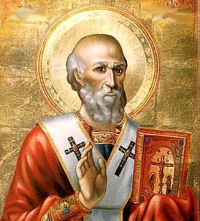9. As the Father has loved me, so have I loved you: continue in my love.
10. If you keep my commandments, you shall abide in my love--even as I have kept my Father's commandments, and abide in his love.
11. These things have I spoken to you, that my joy might remain in you, and that your joy might be full.
AUG. Made bright or glorified; the Greek word may be translated in either way. In Greek it signifies glory; not our own glory, we must remember, as if we had it of ourselves: it is of His grace that we have it; and therefore it is not our own but His glory. For from whom shall we derive our fruitfulness, but from His mercy preventing us.
Wherefore He adds, As My Father has loved Me, even so love I you. This then is the source of our good works. Our good works proceed from faith which works by love: but we could not love unless we were loved first: As My Father has loved Me, even so love I you. This does not prove that our nature is equal to His, as His is to the Father's, but the grace, whereby He is the Mediator between God and man, the man Christ Jesus. The Father loves us, but in Him.
CHRYS. If then I love you, be of good cheer; if it is the Father's glory that you bring forth good fruit, bear no evil. Then to rouse them to exertion, He adds, Continue you in My love; and then shows how this is to be done: If you keep My commandments, you shall abide in My love.
AUG. Who doubts that love precedes the observance of the commandments? For who loves not, has not that whereby to keep the commandments. These words then do not declare whence love arises, but how it is shown, that no one might deceive himself into thinking that he loved our Lord, when he did not keep His commandments. Though the words, Continue you in My love, do not of themselves make it evident which love He means, ours to Him, or His to us, yet the preceding words do: I love you, He says: and then immediately after, Continue you in My love.
Continue you in My love, then, is, continue in My grace; and, If you keep My commandments, you shall abide in My love, is, Your keeping of My commandments will be evidence to you that you abide in My love. It is not that we keep His commandments first, and that then He loves; but that He loves us, and then we keep His commandments. This is that grace, which is revealed to the humble, but hidden from the proud. But what means the next words, Even as I have kept My Father's commandments, and abide in His love: i.e., the Father's love, wherewith He loves the Son.
Must this grace, wherewith the Father loves the Son, be understood to be like the grace wherewith the Son loves us? No; for whereas we are sons not by nature, but by grace, the Only Begotten is Son not by grace, but by nature. We must understand this then to refer to the manhood in the Son, even as the words themselves imply: As My Father has loved Me, even so love I you.
The grace of a Mediator is expressed here; and Christ is Mediator between God and man, not as God, but as man. This then we may say, that since human nature does not pertain to the nature of God, but does by grace pertain to the Person of the Son, grace also pertains to that Person: such grace as has nothing superior, nothing equal to it. For no merits on man's part preceded the assumption of that nature.
ALCUIN. Even as 1 have kept My Father's commandments. The Apostle explains what these commandments were: Christ became obedient to death, even the death of the cross (Phil 2:8).
CHRYS. Then because the Passion was now approaching to interrupt their joy, He adds, These things have I spoken to you, that my joy may remain in you: as if He said, And if sorrow fall upon you, I will take it away, so that you shall rejoice in the end.
AUG. And what is Christ's joy in us, but that He deigns to rejoice on our account? And what is our joy, which He says shall be full, but to have fellowship with Him? He had perfect joy on our account, when He rejoiced in foreknowing, and predestinating us; but that joy was not in us, because then we did not exist: it began to be in us, when He called us. And this joy we rightly call our own, this joy wherewith we shall be blessed; which is begun in the faith of them who are born again, and shall be fulfilled in the reward of them who rise again.
Catena Aurea John 15





 A champion of orthodoxy! He did not die a martyr, but his life was martyrdom in the truest sense. Athanasius was the Church's greatest hero in the battle against Arianism (a heresy that denied Christ's divinity). Even as a young deacon at the Council of Nicea (325), he was recognized as "Arius' ablest enemy" and the foremost defender of the Church's faith. After the death of his bishop (328), "the entire Catholic congregation with one accord, as one soul and body, voiced the wish of the dying bishop Alexander that Athanasius should succeed him. Everyone esteemed him as a virtuous, holy man, an ascetic, a true bishop."
A champion of orthodoxy! He did not die a martyr, but his life was martyrdom in the truest sense. Athanasius was the Church's greatest hero in the battle against Arianism (a heresy that denied Christ's divinity). Even as a young deacon at the Council of Nicea (325), he was recognized as "Arius' ablest enemy" and the foremost defender of the Church's faith. After the death of his bishop (328), "the entire Catholic congregation with one accord, as one soul and body, voiced the wish of the dying bishop Alexander that Athanasius should succeed him. Everyone esteemed him as a virtuous, holy man, an ascetic, a true bishop." 

